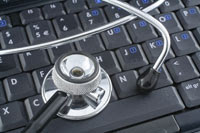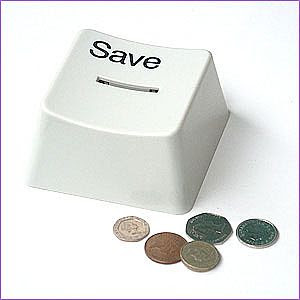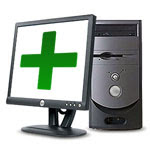7. Reduce Recycling Bin Size – The default maximum size of the Recycle Bin is 10% of your hard drive. When your Recycling Bin is full, this can be a big waste of drive space. Reducing the Maximum size prevents excess space from being wasted. To change the Recycling Bin Size, Right Click on the "Recycle Bin"- Left Click on "Properties" - select the "Global" tab - "Use one setting for all drives" - move the slider to "3%".
June 09, 2013
Speed Up Your PC
7. Reduce Recycling Bin Size – The default maximum size of the Recycle Bin is 10% of your hard drive. When your Recycling Bin is full, this can be a big waste of drive space. Reducing the Maximum size prevents excess space from being wasted. To change the Recycling Bin Size, Right Click on the "Recycle Bin"- Left Click on "Properties" - select the "Global" tab - "Use one setting for all drives" - move the slider to "3%".
Disaster Recovery Plans
March 15, 2011
"Why do I keep getting viruses?!"
- Don’t click on any website links that promise to “Speed Up Your PC” or “Remove Existing Viruses”. Many of these sites are scams or rogue security software that will not only infect your PC, but will make you pay them to fix it.
- Secure your internet connection with a hardware firewall (router). Routers are relatively cheap and easy to configure and they offer increased protection against internet threats.
- Use a web filtering program like K9 Web Protection. Web filtering programs like K9 can automatically block known malicious websites or website categories you designate as inappropriate. They can also allow you to limit internet browsing times and provide reports to help monitor and control web activity. This is a great FREE tool, especially if you have kids.
- Don’t open suspicious email attachments even if you know the sender. It is quite common for infected PC’s to send out malicious emails or attachments to users in the sender’s email contact list.
- Lastly: Use a good anti-virus program, keep your virus definitions up to date and run regular virus scans either nightly or weekly.
June 30, 2010
Todd Kile - IT Consulting in Milwaukee, WI
 Check out my website to find out more about my IT consulting business at www.toddkile.com. There you will find helpful tips, downloads, web links, and more information about my experience and services.
Check out my website to find out more about my IT consulting business at www.toddkile.com. There you will find helpful tips, downloads, web links, and more information about my experience and services.I service businesses and residential customers in the greater Milwaukee, WI area. Services include networking, systems security, hardware and software training, remote help desk support, on-site consulting, and a variety of other services.
April 07, 2009
Free Software Recommendations
 The myriad software applications, tools and utilities available on the market today can be a little overwhelming to the average consumer. Are there reliable, free anti-malware (e.g. anti-virus, anti-spyware) programs? Is there a free alternative to MS Office? Can you download free software to optimize and speed up your PC? The answer to all of these questions is “yes!” You just need to know where to look.
The myriad software applications, tools and utilities available on the market today can be a little overwhelming to the average consumer. Are there reliable, free anti-malware (e.g. anti-virus, anti-spyware) programs? Is there a free alternative to MS Office? Can you download free software to optimize and speed up your PC? The answer to all of these questions is “yes!” You just need to know where to look.I have comprised a list of several free programs that I have first-hand experience with and highly recommend. These programs are not just for those on a budget, but for those who are curious and just want to try something different. While some of these programs may not do “everything” that commercial software will do, most of them do a pretty good job. It is definitely worth a shot to give them a try. After all, you can’t beat the price and you just might be surprised with the results.
Anti-Malware
• Malwarebytes Anti-Malware
• SuperAntispyware
Anti-Virus software
• AVG
• Avast
PC Optimizers/Cleaners
• CCleaner
• ATF Cleaner
Productivity Suite (Nice Microsoft Office Alternative)
• Open Office
Photo/Graphics Editing
• Picasa
• Gimp
Sound Editor
• Audacity
FTP Client (Requires Firefox Web Browser)
• FireFTP
Email Client (Requires Firefox Web Browser – Yes, I love Firefox!!)
• Thunderbird
Remote PC Networking
• LogMeIn
Media Players
• VLC Player
These are just a few of the free programs that I have used. There are far too many to list in this article, but if you have any requests, please let me know what you are looking for and I’ll do my best to recommend additional software. You can also check out my website at www.toddkile.com for other tips and recommendations ... TK
January 14, 2009
Secure Your Email!!

2009 is here, ready or not. With a new year, expect new technology. With new technology, expect new security threats. It’s inevitable. No matter how hard you try to protect and secure your data at home or at work, some 15 year-old in Iowa will figure out a way to beat the system. While I can’t prevent hackers from stealing your data, I CAN give you some advice to better protect your data.
At the workplace, don't send critical files via email. Ask your IT staff if they can set up a secure FTP site. FTP is a fast, easy, and secure way to transmit files to your staff and clients. Most people at home don't have the luxury of FTP so they resort to email as the primary means of sending files.
If email is your only option for sending files, use encryption to protect your attachments. Here are few programs that will encrypt/password protect your email attachments.
1. WINZIP— Use WinZip to compress and password protect the files you attach to emails. You can purchase and download WinZip at www.winzip.com.
2. PGP— Is much more secure than WinZip. PGP is a very effective way to send secure files via email. Using encryption technology, PGP only allows the intended recipient of the email to open the attachment which make it an ideal solution very very critical files sent at the workplace.
To learn more about PGP, go to www.pgp.com.
3. GPG - Is a FREE alternative to PGP, but has a little bit of a learning curve. You can't beat the price, though. Check it out at www.gnupg.org.
I can't stress enough how important it is to secure your data. Sending files with critical information through email in an “unprotected state” is very dangerous. Don't wait until your data is compromised before you decide to take action. I've seen first-hand what can happen when important emails are intercepted and the consequences can be dire.
TK
August 07, 2008
Recommended Technology Sites
Here are some useful websites that I visit frequently for the latest technology news and reviews.
CNET - Reviews, articles, downloads.
PCWorld - Online version of the magazine.
PCMagazine - Online version of the magazine.
TechWeb - Latest technology news.
tech-tips - Tips on a variety of technology topics.
VirtualDr - Discussions on various computer topics.
VirusList - Detailed Internet security information.
TK
May 27, 2008
Speed Up Your PC

7. Reduce Recycling Bin Size – The default maximum size of the Recycle Bin is 10% of your hard drive. When your Recycling Bin is full, this can be a big waste of drive space. Reducing the Maximum size prevents excess space from being wasted. To change the Recycling Bin Size, Right Click on the "Recycle Bin"- Left Click on "Properties" - select the "Global" tab - "Use one setting for all drives" - move the slider to "3%".
